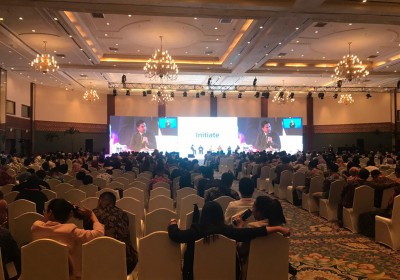IDF 2019 Delivers Four Recommendations for an Inclusive Future
July 30, 2019
The Initiate Plenary session.
The Indonesia Development Forum (IDF) 2019, held at the Jakarta Convention Centre (JCC), Jakarta, July 22-23, 2019, and highlighted the theme of Mission Possible: Seizing the Opportunities of Future Work to Drive Inclusive Growth, resulted in four key policy pillars. The Minister of National Development Planning / Head of National Development Planning Agency, Bambang Brodjonegoro, elaborated on these four policies during his speech to close IDF 2019, Tuesday afternoon.
These four key policy pillars include:
-
Driving the establishment and growth of new businesses.
-
Modernising household and micro, small, and medium enterprises.
-
Promoting an inclusive workforce.
-
Preparing a skilled workforce for the future.
These recommendations are expected to address several challenges in the current employment landscape, one of which is the slow structural transformation, making most of the jobs created for the last two decades fall into the category of low productivity jobs.
Also, investment growth has slowed down, particularly on labor-intensive, owing to the rigid investment and business climate. The next challenge is the low quality of human capital in Indonesia, which is indicated by the majority of our workforce only graduated from Junior High School or lower, and have low skills.
Other challenges include low participation from women and other marginalised groups in the workforce, and the lack of skills on most occupations caused by the mismatching output of the education system, mainly between vocational education and the needs of the labor market.
In the Initiate Plenary session, Bambang said that IDF 2019 becomes a critical part of Bappenas’ role in development planning.
“What has been occurring in the past two days is called participatory planning. Usually, it is conducted formally, but in IDF 2019, it happens more loosely,” said Minister Bambang, who preferred to use mural graphic recording unique to IDF.
Minister Bambang also said that during the two days of IDF, many issues in development and workforce have been identified.
“I am delighted, because besides many problems arising, more importantly, there are also many solutions,” he added.
These solutions were contributed by, among others, youth groups, including through startups.
One emerging issue is the gap between human resource and the demand from the labor market. Responding to this, the Minister of Manpower Hanif Dhakiri, explained that the ecosystem needs to be improved, from rigid to flexible. Subsequently, mapping the future labor market will be crucial.
The relatively passive labor market needs to be changed to more active, with the government’s intervention. Skills, said Hanif, must be made adaptive to match future needs.
“Nothing is safe today, everyone must have the ability to adapt,” said Hanif. Also, he said, the employee social security must be expanded.
“I propose security for losing a job,” added Hanif.
Also, he proposed the need for security of training and certification.
Various parties in IDF 2019 have presented their ideas and shared stories on good practices related to these four key recommendations. For example, on the ‘preparing skilled workforce for the future’, the International Labour Organization (ILO) participated in the Special Session entitled “Long and Winding Road to Quality Apprenticeship in Indonesia”. On this session, ILO promoted ideas and good practices on apprenticeship.
“Apprenticeship is an education program that integrates practical training in the workplace. This program is well-structured,” said, ILO’s Employment Specialist.
Trans Retail represented the business world and participated in this session.
“One period of apprenticeship in our company goes for 6 months. Every period for the last 20 years, we absorb 3,000 people. From this number, we have managed to recruit 75 per cent of them,” said Sumarni Mahapertiwi, HR Service Specialist of PT Trans Retail.
Results from IDF 2019 will serve as inputs that support the government in developing evidence-based policy solutions on creating and seizing work opportunities to drive inclusive growth. For two days, IDF has engaged numerous stakeholders from the government, scholars, researchers, industries, youth groups, initiators from various business sectors, people with disabilities, women groups, indigenous groups, and others.
The IDF event was organised by Bappenas and supported by the Australian Government through Knowledge Sector Initiative (KSI). KSI is a collaboration program between the Governments of Indonesia and Australia, which aims to improve the welfare of Indonesian people through high-quality public policies that use researches, analyses, and evidence in a better way.
This year, IDF has entered its third consecutive year, and the results will serve as inputs that support the government in developing evidence-based policy solutions on creating and seizing work opportunities to drive inclusive growth.
IDF 2019 aims to collect ideas and thinking to prepare future workers, create new, good jobs, mobilise structural transformation, and ensure development results are equal, inclusive, and sustainable.
These endeavors are in line with efforts to fulfill Sustainable Development Goals (SDGs), especially goal 8, namely to promote inclusive and sustainable economic growth, employment, and decent work for all, and also goal 9, namely to build resilient infrastructure, promote inclusive and sustainable industrialisation, and foster innovation, as well as other relevant goals.
Thank you for actively conveying your recommendation for future work opportunities in Indonesia. See you in next year’s IDF!
Indonesia’s Research Institutions Supporting the Development of the Electric Vehicle Industry
Indonesian Muslim Fashion and Cosmetics IKMs Shine at Dubai World Expo 2020
Govt Steps Up UMKM Transformation Efforts in the Midst of Pandemic Slowdown
Govt Encourages Promotion of IKM Products in Digital Era
Government Begins Developing Maritime Training Center in Makassar
Tweets by IDDevForum
